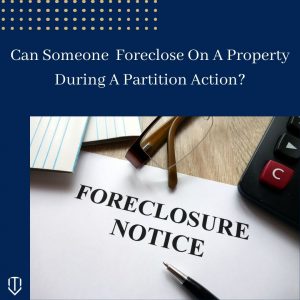What is a Partition Action?
A partition action is a court-ordered process where a property owner forces a sale of jointly owned real estate. Essentially, a partition action exists to allow people who own real estate together to take their share of the equity and go their separate ways. But, as simple as this seems, partition actions can often become complex lawsuits. Disputes commonly arise as to what type of partition may be sought and the process for determining ownership interests.
For example, “Julie” bought a house with her boyfriend, “Shawn,” thinking that they would get married one day. Later, after they had bought the house, Julie realized that her boyfriend was not the right person for her. Because Julie wanted to move on in her life, she also wanted to sell the house she bought with her boyfriend. Her boyfriend, however, was mad at Julie for breaking up with him and so refused to agree to sell the house. Because they were not married, Julie could not go to a divorce lawyer, and because they both did not agree to sell, a realtor could not help Julie. Julie felt trapped. Julie then, however, found a partition lawyer and was able to get the house sold so she could move on with her life. A partition lawyer got the job done.
 California Partition Law Blog
California Partition Law Blog


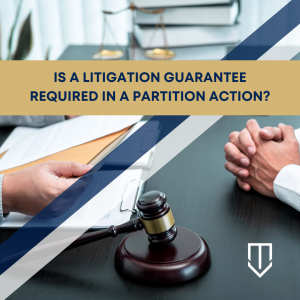 While litigation guarantees are recommended in a lot of contested real estate issues in court, it is not required in a
While litigation guarantees are recommended in a lot of contested real estate issues in court, it is not required in a 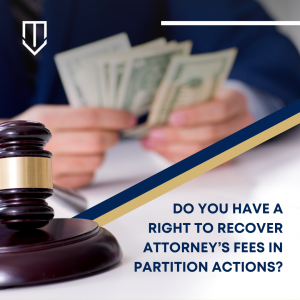 Yes. In California, you have a right to recover attorney’s fees by statute. But that doesn’t mean that you can recover 100% of your fees, even in
Yes. In California, you have a right to recover attorney’s fees by statute. But that doesn’t mean that you can recover 100% of your fees, even in 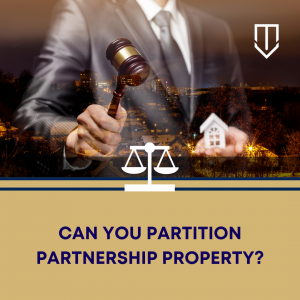 Yes. Partnership property is subject to partition on the dissolution, accounting, and wind-up of partnership matters, just like other types of property. As real estate presents unique issues, however, there are many important things to know about the process to ensure that it is done correctly. The purpose of this blog post is to address some of the issues involved with partitioning property belonging to a partnership.
Yes. Partnership property is subject to partition on the dissolution, accounting, and wind-up of partnership matters, just like other types of property. As real estate presents unique issues, however, there are many important things to know about the process to ensure that it is done correctly. The purpose of this blog post is to address some of the issues involved with partitioning property belonging to a partnership.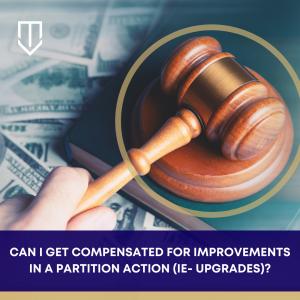 Yes. A party may be able to receive credits and/or offsets for upgrading a property in a partition action under many circumstances. In a
Yes. A party may be able to receive credits and/or offsets for upgrading a property in a partition action under many circumstances. In a 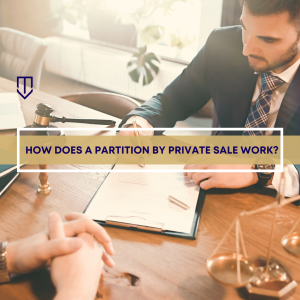 Partition by a private sale is a method of selling jointly owned property, either by joint tenants or tenants in common, under the court’s supervision via a court order or a court-ordered referee.
Partition by a private sale is a method of selling jointly owned property, either by joint tenants or tenants in common, under the court’s supervision via a court order or a court-ordered referee. 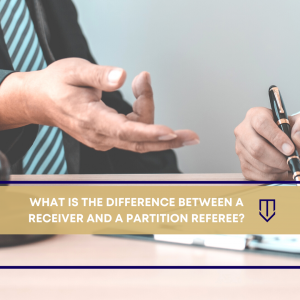 Partition receivers and partition referees serve very similar roles in partition lawsuits. Their roles are to act as a third party with no ties to any of the co-owners interests in property via a partition lawsuit and to help the court and the judge to distribute the property or proceeds from the sale of the property fairly and equitably. Read on to find out the important differences between the two.
Partition receivers and partition referees serve very similar roles in partition lawsuits. Their roles are to act as a third party with no ties to any of the co-owners interests in property via a partition lawsuit and to help the court and the judge to distribute the property or proceeds from the sale of the property fairly and equitably. Read on to find out the important differences between the two. 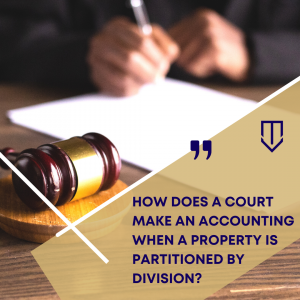 When there is a court-ordered partition by division, there are several steps that both the court and parties take to ensure that the property is physically divided both equally and equitably. Read on to find out the different avenues the court takes when deciding a partition by division lawsuit.
When there is a court-ordered partition by division, there are several steps that both the court and parties take to ensure that the property is physically divided both equally and equitably. Read on to find out the different avenues the court takes when deciding a partition by division lawsuit. 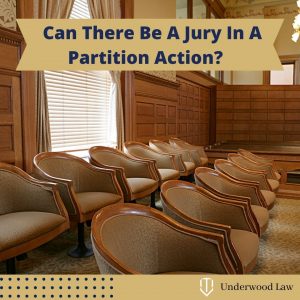 Generally speaking, no, jury trials are not available in partition actions because partition action lawsuits are generally based on equity and therefore do not need a jury trial to decide each party’s rights.
Generally speaking, no, jury trials are not available in partition actions because partition action lawsuits are generally based on equity and therefore do not need a jury trial to decide each party’s rights.